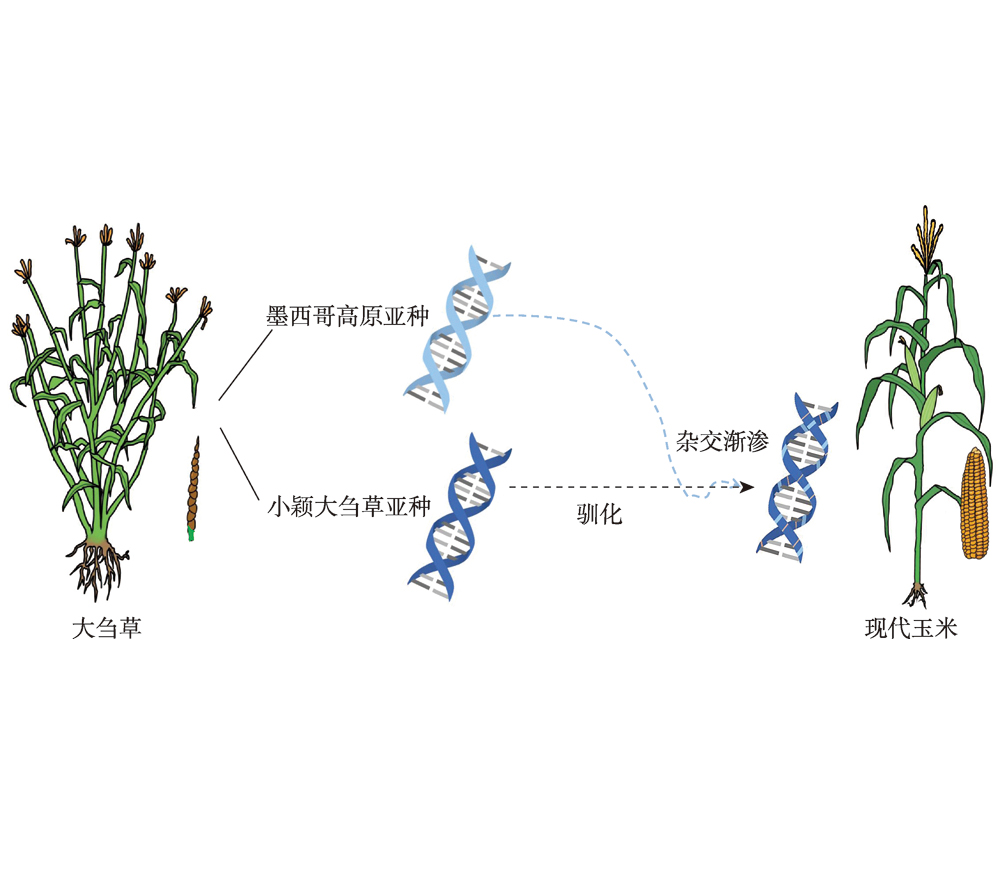

现代玉米起源新见解——两类大刍草的混血
收稿日期: 2023-10-10
录用日期: 2023-10-17
网络出版日期: 2023-12-01
基金资助
国家杰出青年基金(31825015)
New Insights Into the Origin of Modern Maize-hybridization of Two Teosintes
Received date: 2023-10-10
Accepted date: 2023-10-17
Online published: 2023-12-01
农作物驯化推动了农业文明的出现和繁荣, 是人类历史上的重大事件。玉米(Zea mays)作为全球范围内的重要粮食作物, 其驯化起源一直备受生物学和历史学界的关注。之前, 现代玉米起源自小颖大刍草亚种(Z. mays subsp. parviglumis)的观点一直占主流地位。近期, 严建兵与其合作团队系统收集并梳理了玉米各种类型野生种和栽培种资源, 综合运用基因组学、群体遗传学和数量遗传学方法及考古学成果, 发现现代玉米也存在墨西哥高原亚种(Z. mays subsp. mexicana)的杂交渐渗, 并影响了诸多农艺性状, 进而提出现代玉米起源的新模型。

于熙婷 , 黄学辉 . 现代玉米起源新见解——两类大刍草的混血[J]. 植物学报, 2023 , 58(6) : 857 -860 . DOI: 10.11983/CBB23138
The domestication of crops was a significant event in human history, which led to the emergence and prosperity of agricultural civilization. Maize is an important global food crop, and its domestication origin has long attracted the attention of both the biological and historical communities. The mainstream view in the past was that modern maize originated from the parviglumis type of teosinte. Recently, Yan Jianbing and his collaborators systematically collected and sorted various types of wild and cultivated maize resources, and comprehensively applied genomics, population genetics, and quantitative genetics methods, along with the use of archaeological findings. They found that modern maize also has the gene introgression of the mexicana type of teosinte, which has influenced many agronomic traits. A new model for the origin of modern maize has been proposed based on these findings.

Key words: maize; teosinte; genome; domestication; introgression
| [1] | Calfee E, Gates D, Lorant A, Perkins MT, Coop G, Ross-Ibarra J (2021). Selective sorting of ancestral introgression in maize and teosinte along an elevational cline. PLoS Genet 17, e1009810. |
| [2] | Doebley JF, Gaut BS, Smith BD (2006). The molecular genetics of crop domestication. Cell 127, 1309-1321. |
| [3] | Huang XH, Huang SW, Han B, Li JY (2022a). The integrated genomics of crop domestication and breeding. Cell 185, 2828-2839. |
| [4] | Huang XH, Kurata N, Wei XH, Wang ZX, Wang AH, Zhao Q, Zhao Y, Liu KY, Lu HY, Li WJ, Guo YL, Lu YQ, Zhou CC, Fan DL, Weng QJ, Zhu CR, Huang T, Zhang L, Wang YC, Feng L, Furuumi H, Kubo T, Miyabayashi T, Yuan XP, Xu Q, Dong GJ, Zhan QL, Li CY, Fujiyama A, Toyoda A, Lu TT, Feng Q, Qian Q, Li JY, Han B (2012). A map of rice genome variation reveals the origin of cultivated rice. Nature 490, 497-501. |
| [5] | Huang YC, Wang HH, Zhu YD, Huang X, Li S, Wu XG, Zhao Y, Bao ZG, Qin L, Jin YB, Cui YH, Ma GJ, Xiao Q, Wang Q, Wang JC, Yang XR, Liu HJ, Lu XD, Larkins BA, Wang WQ, Wu YR (2022b). THP9 enhances seed protein content and nitrogen-use efficiency in maize. Nature 612, 292-300. |
| [6] | Hufford MB, Lubinksy P, Pyh?j?rvi T, Devengenzo MT, Ellstrand NC, Ross-Ibarra J (2013). The genomic signature of crop-wild introgression in maize. PLoS Genet 9, e1003477. |
| [7] | Jing CY, Zhang FM, Wang XH, Wang MX, Zhou L, Cai Z, Han JD, Geng MF, Yu WH, Jiao ZH, Huang L, Liu R, Zheng XM, Meng QL, Ren NN, Zhang HX, Du YS, Wang X, Qiang CG, Zou XH, Gaut BS, Ge S (2023). Multiple domestications of Asian rice. Nat Plants 9, 1221-1235. |
| [8] | Li CB, Zhou AL, Sang T (2006). Rice domestication by reducing shattering. Science 311, 1936-1939. |
| [9] | Matsuoka Y, Vigouroux Y, Goodman MM, Sanchez GJ, Buckler E, Doebley J (2002). A single domestication for maize shown by multilocus microsatellite genotyping. Proc Natl Acad Sci USA 99, 6080-6084. |
| [10] | P??bo S (2015). The diverse origins of the human gene pool. Nat Rev Genet 16, 313-314. |
| [11] | Wang H, Studer AJ, Zhao Q, Meeley R, Doebley JF (2015). Evidence that the origin of naked kernels during maize domestication was caused by a single amino acid substitution in tga1. Genetics 200, 965-974. |
| [12] | Yang N, Wang YB, Liu XG, Jin ML, Vallebueno-Estrada M, Calfee E, Chen L, Dilkes BP, Gui ST, Fan XM, Harper TK, Kennett DJ, Li WQ, Lu YL, Luo JY, Mambak-kam S, Menon M, Snodgrass S, Veller C, Wu SS, Wu SY, Xiao YJ, Yang XH, Stitzer MC, Runcie D, Yan JB, Ross-Ibarra J (2023). Two teosintes made modern maize. Science doi: 10.1126/science.adg8940 |
| [13] | Yu H, Lin T, Meng XB, Du HL, Zhang JK, Liu GF, Chen ML, Jing YH, Kou LQ, Li XX, Gao Q, Liang Y, Liu XD, Fan ZL, Liang YT, Cheng ZK, Chen MS, Tian ZX, Wang YH, Chu CC, Zuo JR, Wan JM, Qian Q, Han B, Zuccolo A, Wing RA, Gao CX, Liang CZ, Li JY (2021). A route to de novo domestication of wild allotetraploid rice. Cell 184, 1156-1170. |
/
| 〈 |
|
〉 |